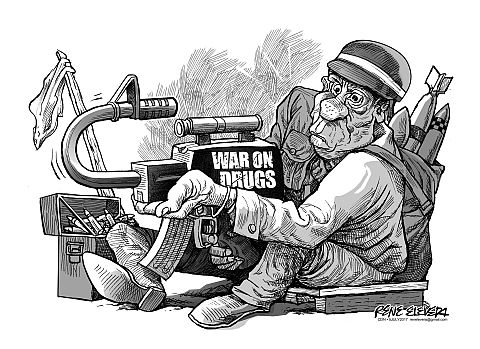
Last Saturday marked the first year of President Rodrigo Duterte’s term of office, and it would be almost pointless to complain about his war on illegal drugs if it were not for the fact that it hit a speed bump that was serious enough to make it pause and recalibrate its campaign without drawing too much attention to itself.
It was the President himself who said he doesn’t mind if his administration didn’t achieve anything major so long as he stopped the illegal drug trade for good or at least reduced it to manageable levels.
Even before he assumed office, the war on illegal drugs took on a darker and more aggressive turn as dead bodies began littering the city streets and roads and deaths by drug suspects due to operations that have become so frequent they’ve come to be the norm in the past year.
Jeffrey “Jaguar” Diaz and Albuera mayor Rolando Espinosa were among the high-profile drug suspects who died at the hands of law enforcers who were spurred on by President Duterte’s strong, expletive laced language to hunt down and kill them if they resist arrest.
While the President was unapologetic and even furious at those who dare question his war on drugs—from the US to the rights groups and to the families of the drug suspects themselves—it was only a matter of time before his generals made a monumental blunder that stopped the war at least momentarily on its tracks.
No, it wasn’t the politicians and the police generals whose guilt and alleged involvement in the drug trade have yet to be proven beyond reasonable doubt, nor was it high-profile businessmen like Peter Lim whose name had surfaced previously in congressional investigations into the drug trade.
It was the murder of South Korean businessman Jee Ick Joo in front of the National Police’s Camp Crame headquarters on Oct. 16 last year, weeks after he was kidnapped, that showed how easily corruptible and vulnerable the police were when it came to waging war on the illegal drug traffickers.
Whether they were ordered by the Korean mafia to do it or they did it of their own accord, the police’s Anti-Illegal Drugs Group (AIDG) was disbanded and its officers detained.
The war also resulted in the promotion of the Philippine Drug Enforcement Agency (PDEA), whose existence was threatened with President Duterte’s initial plan to have it disbanded, into the driver’s seat of the anti-drug war.
Yes, there are still “unexplained” executions of drug suspects but they are fewer in number than the deaths caused during actual police operations that can be explained away as part of the risks and realities of the job by the police.
And despite the appeals for due process by rights groups and critics, the anti-drug war had been enjoying public support based on surveys. But it only takes another blunder to expose it to public scrutiny and criticism.